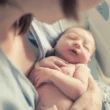Most of the time, when we talk about the knowledge we gain from understanding our bodies, we talk about the benefits – perhaps because they can be life-changing. Understanding your fertility can help you find proper treatment and management for conditions such as PCOS, migraines, painful periods, endometriosis, and so much more. But sometimes, gaining knowledge doesn’t actually translate to solving the main problem or correcting the source of the pain. Sometimes, even though we’ve gained knowledge from fertility awareness, we still have to carry the pain of early pregnancy loss for the rest of our lives.
As a bereavement doula, I work with families experiencing a miscarriage, stillbirth, or infant loss. Many of these families come to me after using fertility awareness methods. What some of their support systems may not realize is how complicated an early child loss can make fertility awareness. There are many reasons why this is true, but today I want to highlight one of the most common: being aware of our fertility can make us aware of early pregnancy losses we wouldn’t otherwise have recognized.
This is the first of three key takeaways I want to highlight from what I have learned about fertility awareness and grief.
Takeaway #1: Not all body knowledge from fertility awareness is easy to receive or positive. It can actually be devastating.
If a couple is paying attention to and able to understand what is happening with their fertility, it’s easier for them to know when they think the woman might be pregnant. We don’t have good studies on this, or on many aspects of very early loss. But anecdotally and logically, we can see how fertility awareness methods (FAMs) would change how soon someone realizes that they are pregnant. For example, I see a lot of my FAM-using friends taking early pregnancy tests starting at 8 days post-ovulation, while my non-FAM-using friends tend to wait until the day they expect their period to arrive. I believe this also means that FAM users are more likely to identify when they’ve had certain types of early pregnancy loss.
The vast majority of pregnancy losses (our best estimates are around 80%) occur in the first trimester, and at least 16% of pregnancy losses happen before someone can even be seen by a doctor[1]. Someone may think they have a strange period, not realizing it is truly a miscarriage. But, if your fertility is an important data point in your sense of wellbeing or in your family planning, it makes sense that you’re more likely to understand what is truly going on, especially if you took an early pregnancy test.
FAM knowledge doesn’t fix the pain of a life that’s already been lost
Usually, when we share with others what we were able to do because of the knowledge we gained through FAMs, there’s a sense of joy or relief, coupled with a sense of accomplishment. We were able to gain knowledge and use it to fix a condition, and our lives are now better. But, for parents who’ve experienced loss, the knowledge gained through FAMs can’t fix the loss of a child. These parents cannot use that information to get their child back. Instead, they have to carry that information with them for the rest of their lives.
This leads us to my second takeaway.
Takeaway #2: Grieving parents may feel angry at, or even resent, FAMs for placing the burden of knowledge on them, even if at the same time they are grateful for that knowledge as well.
Knowledge of a very early loss is a double-edged sword. This can be a beautiful gift – recognizing that a pregnancy has occurred, memorializing the human who has died. And it can also be a painful burden. Grieving parents often tell me their relationship with fertility awareness has soured because of their loss. “I can’t stop thinking how if I hadn’t been charting, I wouldn’t have a lifetime of grief awaiting me now,” one client texted me recently.
“I can’t stop thinking how if I hadn’t been charting, I wouldn’t have a lifetime of grief awaiting me now,” one client texted me recently.
One common response folks have is, “I’m just not charting for a while. I can’t handle it.” Given the pain of this knowledge, more knowledge— even if it likely won’t be the same information— feels too hard to seek out.
Families who experience early pregnancy loss benefit from the support and encouragement of others who have experience holding space for the “both/and”. Grieving parents both value the knowledge we can get from fertility awareness— and the truly amazing things we can often do with that knowledge— and they grasp oh-so-concretely that sometimes what we learn doesn’t lead to a miracle or a cure but rather to emptiness and grief. Especially early on in the grieving process, the wonders of fertility awareness may recede into the background of a couple’s minds (especially for the mother) as the full emotional weight of a child’s life prematurely lost takes center stage.
The bottom line on fertility awareness and early pregnancy loss
Especially in the immediate aftermath of loss, families don’t need someone insisting that “so-and-so tried x, y, or z medical intervention or supplement and they carried their next baby to term!”, nor judging them for feeling angry that fertility awareness didn’t lead to a live birth and even made this situation harder for them. These couples benefit from sturdy friendships that allow them to grieve on their own timeline and assist them in finding their way back to fertility awareness charting (and potentially medical assistance) when they’re ready. They deserve to be listened to in their pain and to know that, no matter their thoughts and feelings about fertility awareness, family and friends are at their side and they are not alone.
References:
[1] Dugas C, Slane VH. Miscarriage. [Updated 2022 Jun 27]. In: StatPearls [Internet]. Treasure Island (FL): StatPearls Publishing; 2023 Jan-. Available from: https://www.ncbi.nlm.nih.gov/books/NBK532992/#Additional Reading:
Resources for healing after miscarriage and other forms of child loss
Healing after the heartbreak and loneliness of a miscarriage







